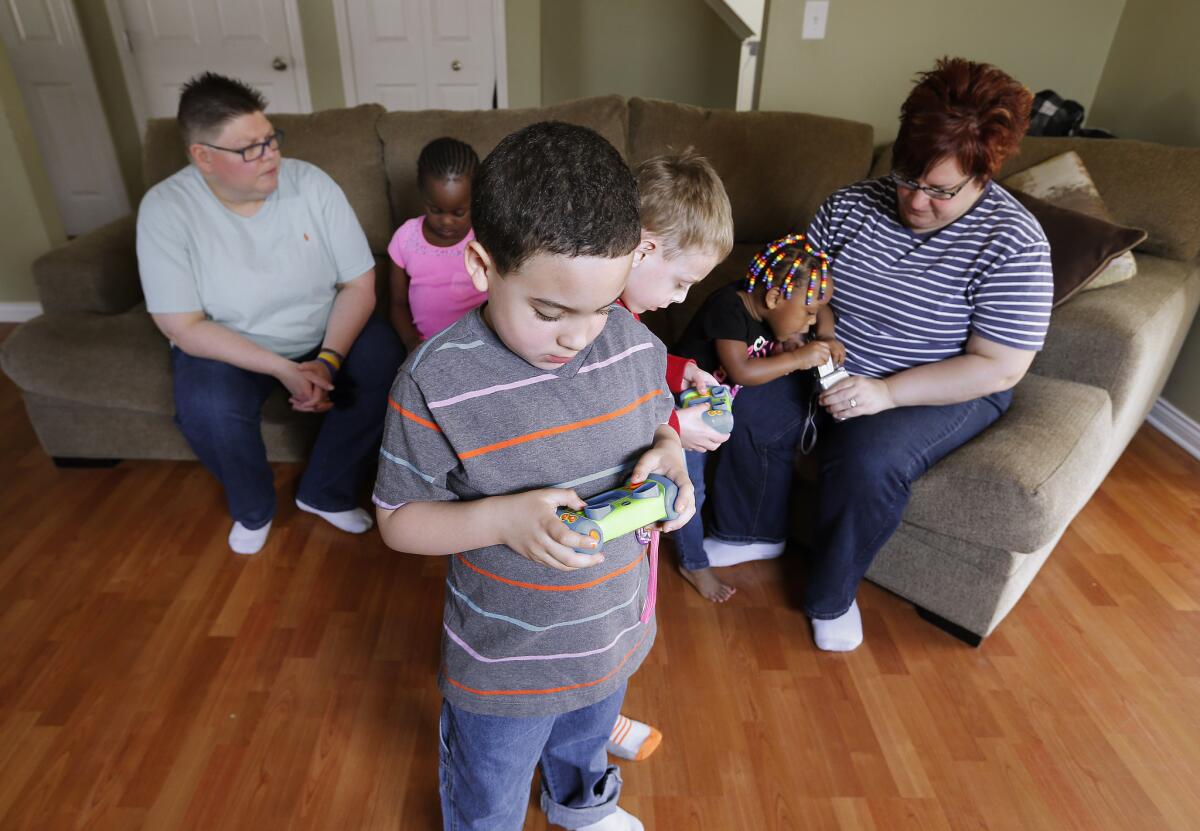Editorial: The Supreme Court flawlessly handles the issue of gay rights and adoption

Jayne Rowse, left, and April DeBoer, right, sit with their adopted children Ryanne, 6, from left, Nolan, 6, Jacob, 5, and Rylee, 2, at their home in Hazel Park, Mich. on April 12, 2015.
- Share via
Less than a year ago, a sharply divided Supreme Court ruled 5-4 that the Constitution requires states to permit same-sex marriage, and each of the justices in the minority filed a dissenting opinion. But on Monday, there was no such discord: Without even hearing arguments and with no recorded dissent, the court reversed an Alabama Supreme Court ruling that refused to recognize a woman’s adoption of her female partner’s biological children.
Although the legal issues were different, the matter-of-fact way in which the court handled this case was a gratifying sign of how far the ground has shifted on equal rights for gays and lesbians.
While living in Georgia, a woman identified by the court as V.L. adopted three children born to her partner as the result of insemination by an anonymous donor. The couple were living in Alabama years later when their relationship came to an end and V.L. was denied access to the children. She filed suit, and eventually the Alabama Supreme Court ruled that it need not recognize her status as an adoptive parent because a Georgia court had erred in granting her parental rights in the first place.
The precise question before the U.S. Supreme Court was whether Alabama was required to recognize the Georgia adoption because of a clause in the U.S. Constitution requiring states to give “full faith and credit … to the public acts and judicial proceedings of every other state.” In an unsigned opinion, the justices said that the clause did apply because questions of adoption were clearly within the jurisdiction of the court that granted V.L. parental rights. The court added: “A state may not disregard the judgment of a sister state because it disagrees with the reasoning underlying the judgment or deems it to be wrong on the merits.”
Strictly speaking, this decision wasn’t about marriage, either same-sex or opposite-sex. Nor does it require that spouses or partners in same sex couples automatically be accorded parental rights. But it is nevertheless significant in its recognition of the fact that children in this country sometimes have two parents of the same sex and that such arrangements are becoming both more common and increasingly recognized by the law.
Justice Anthony Kennedy emphasized that point last year in the same-sex marriage case. “Most states,” Kennedy noted, “have allowed gays and lesbians to adopt, either as individuals or as couples, and many adopted and foster children have same-sex parents. This provides powerful confirmation from the law itself that gays and lesbians can create loving, supportive families.”
But sometimes, as also happens with heterosexual unions, same-sex relationships break up. That is no reason to dissolve the bonds between children and their adoptive parents.
Follow the Opinion section on Twitter @latimesopinion and Facebook
More to Read
A cure for the common opinion
Get thought-provoking perspectives with our weekly newsletter.
You may occasionally receive promotional content from the Los Angeles Times.









